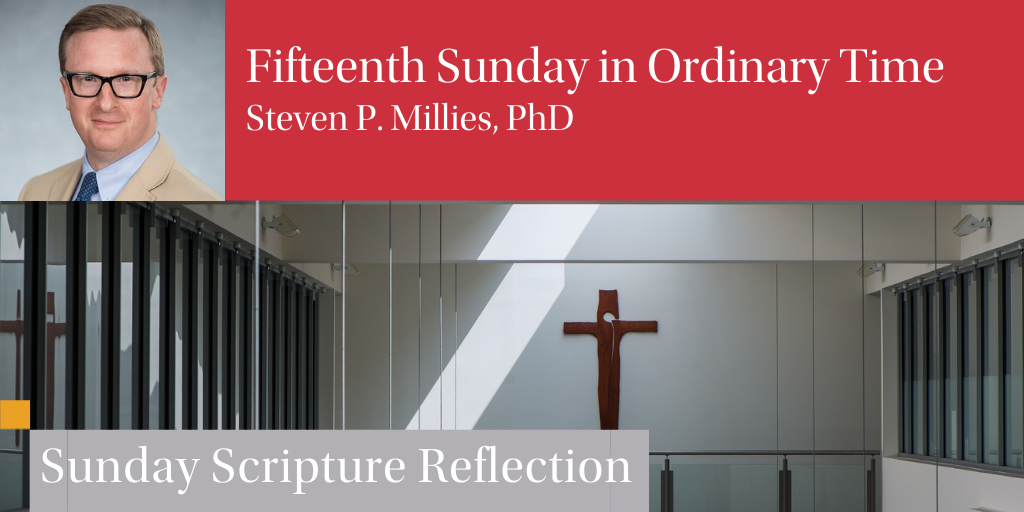
Readings:
Reading I: Deuteronomy 30: 10-14
Psalm 69: 14, 17, 30-31, 33-34, 36, 37
Reading II: Colossians 1: 15-20
Gospel: Luke 10: 25-37
How should a believer live in the world?
That is the not-so-simple question embedded in this week’s readings. And of course, it is the question that lurks around every corner of everyday life for believers today as much as it did in Roman Judea or even at the end of Israel’s forty years of wanderings through the wilderness. Yet we are keenly aware in our contested times that living in the world poses believers with challenges that seem sometimes insurmountable if we want to keep our faith. We can draw comfort from knowing that the challenge always has been the same. We face the temptation to reject and withdraw from the world because it does not meet the high expectations of our faith. We also face the more dangerous temptation to purify the world, to transform it at any cost so that it will meet our expectations. Yet this week’s readings remind us that neither of these really is the right response. Our faith demands something more challenging than the ease of living in a world that makes our faith comfortable. We are called to sacrifice our comfort.
Our first reading from Deuteronomy finds God’s People nearing the end of their long desert journey. Most of the Book of Deuteronomy is concerned with establishing the basis of the Law, the Deuteronomic Code, and at this point where our Lectionary picks up the Law has been explained for many chapters. Yet, after all of that lawgiving and careful detail Moses offers a vital admonition—”For this command that I enjoin on you today is not too mysterious and remote for you….No, it is something very near to you, already in your mouths and in your hearts; you have only to carry it out.” The Law is complex and the details matter. But perhaps what matters most is what is simplest, as Moses says just before this week’s passage—”to love the Lord, your God, with your whole heart and your whole being”(Dt. 30:6). To want to keep the Law because of love of and gratitude to God is the essence of the Law. The Law is a reflection of something more fundamental, a relationship.
Our Mass readings invite us to consider a familiar Gospel story from this point of view. The story of the beaten man and the kind stranger who helps him also is a story about a relationship neither man knew he had. The story teaches them—and us—in fact they always did have a relationship, and their relationhip is important. Jesus tells the story after he has been challenged by a “scholar of the Law,” who in fact quotes the Shema (that is composed of passages which are not in this week’s readings but recall our first reading)—”You shall love the Lord, your God, with all your heart, with all your being, with all your strength, and with all your mind, and your neighbor as yourself.” As scholars will, Jesus’s interlocutor asks an important interpretive question—“Who is my neighbor?”
Pope Francis’s most recent encyclical, Fratelli Tutti, makes use of the familiar parable with which Jesus replied. The encyclical’s subject is “Social Friendship,” a notion Catholic social teaching sums up as “solidarity.” The parable is clear and straightforward,” Pope Francis writes, “yet it also evokes the interior struggle that each of us experiences as we gradually come to know ourselves through our relationships with our brothers and sisters. Sooner or later, we will all encounter a person who is suffering. Today there are more and more of them. The decision to include or exclude those lying wounded along the roadside can serve as a criterion for judging every economic, political, social and religious project. Each day we have to decide whether to” assist those who struggle or to be “bystanders.”
How should a believer live in the world? A believer is called constantly to make the sacrifices that our relationships with our neighbors who are suffering in any way ask us to make. “Who is my neighbor?” Anyone placed on the road with me by the God who created us. There is a relation between us because we were created by the God to whom we owe our being, whose love we return by responding to one another. The discomfort we experience in responding is crucial, it assures us of something important. When we find a “yes” to the call to sacrifice already in our mouths and in our hearts, we only need to carry it out. Then we know we want to honor our relationship with God.
Hard as it is to believe, there is a lively debate in some circles about whether Christianity and social justice are compatible. The Scriptures assure us that the God of Israel whose Law brought Jesus into conversation with the scholar has a message for us. Social justice and Christianity aren’t compatible—they’re indivisible.
